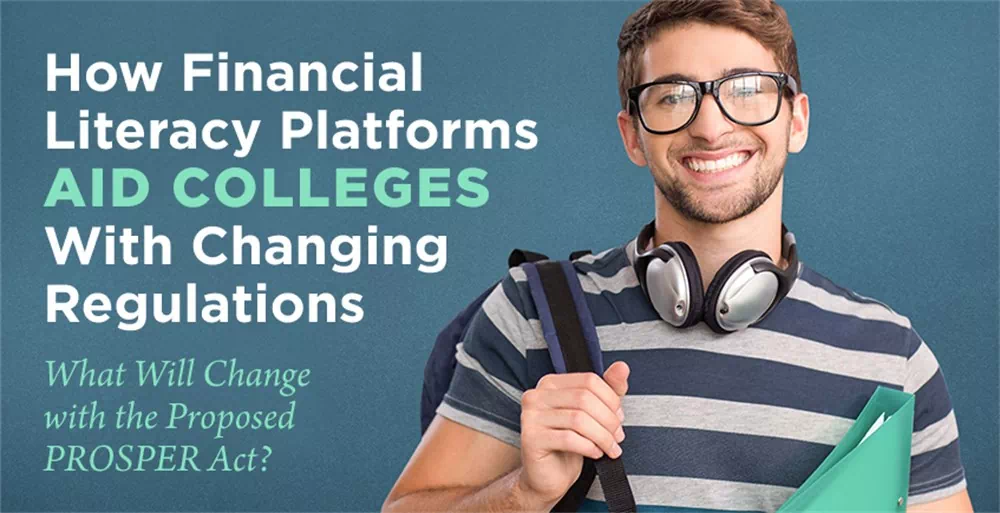What Will Change With the Proposed PROSPER Act?
Financial literacy programs not only provide college students a way to navigate intimidating new finances from higher education, but also help those schools easily react to and adopt changing regulations and updated information; such as those suggested in December by Congresswoman Virginia Foxx of North Carolina to reform the Higher Education Act. If passed, the bill, called Promoting Real Opportunity, Success, and Prosperity through Education Reform (PROSPER) Act, will change how students acquire and repay loans and additionally holds universities accountable should their students fail to repay their loans.
What Does the PROSPER Act Change?
According to its authors, the PROSPER Act is “higher education’s long overdue reform.” Virginia Foxx and Congressman Brett Guthrie (KY) stated: “With six million unfilled jobs and over a trillion dollars in student debt, simply reauthorizing the Higher Education Act will help no one. A hard truth that students, families, and institutions must face is that the promise of a postsecondary education is broken.” With the intention of reforming the US higher education system, the PROSPER Act recommends the following changes:
-
Simplifies repayment options to one standard 10-year repayment plan and one income-based repayment plan
-
Creates a one grant, one loan, and one work-study program
-
Requires annual loan counseling
-
Eliminates or phases out all federal grant programs except for the Pell Grant 1
-
Caps how much one can borrow for graduate or professional school
-
Grants for-profit schools equal access to federal programs 2
-
Disperses loans weekly or monthly rather than once per semester 3
-
Potentially eliminates federal funding for colleges with high percentage of loan borrowers in delinquent status
Annual Loan Counseling in the PROSPER Act
The PROSPER Act also requires students to undergo annual loan counseling, either online or in person, if they take out federal loans, receive a Pell Grant, or take out private loans. Annual loan counseling is provided through the Department of Education, however, for institutions that do not use that tool, a separate online tool is allowed as long as it meets the required standards: providing information ranging from the borrower’s outstanding loan balance, anticipated monthly payments, and contact information for the borrower’s loan servicer.
Financial Education and the PROSPER Act
The PROSPER Act suggests changes which make access to a financial education even more vital. For example, the bill caps graduate and professional school federal loans to $28,500 a year, and eliminates Grad PLUS loans. The potential loss of funding means students may have to turn to private loans which are frequently more expensive, harder to manage and lack the same protections as federal loans. The additional financial strain on students reaffirms the need for a financial education to help students successfully and enjoyably live within the boundaries of their loans as well as manage and plan for repayment.
Financial Wellness Programs Help Educational Institutions Meet New Regulations
The Committee on Education and the Workforce, which Foxx chairs, states that the new bill will “hold all programs at institutions accountable to a loan repayment rate. If an institution’s program does not set a student up for success in repayment, the program will not be eligible for federal aid." Revoking federal funding from colleges which have more than 45% of their borrowers default or late on loan repayments would be one of these accountability measures.
While institutions will likely have to accommodate new regulations, financial wellness programs are already set up to counsel students on loans and repayment. Financial literacy programs, like iGrad, provide immediate actionable information about monitoring outstanding loan balance, tracking accruing interest, and contacting loan servicers. Employing a financial wellness program sets students up for financial success, therefore working to ensure the institution is in line with the new regulations.
PROSPER Is Not A Done Deal - Yet
Congress isn’t expected to vote on the PROSPER Act until sometime in 2018. The act was passed December 12th by the House Education and Workforce Committee with only Republicans voting for it. Democrat Jared Polis of Colorado warned that the bill was rushed and lacked input from colleges and students. There’s also some pushback outside of government—the committee received 47 letters opposing the bill.
Financial wellness programs like iGrad will be there to guide students through the complicated maze of loans and repayment whether or not PROSPER is passed. Debt has become a norm in the U.S.—44.2 million Americans have student loan debt. The extreme hardships of debt is evidenced by the 11.2 percent of individuals delinquent on their repayments and the rising amount of debt students take on. (The average class of 2016 graduate’s total in student loan debt is $37,172, up six percent from 2015 4.) Colleges that employ financial literacy programs are combatting this worrisome trend. With the resources financial education programs like iGrad provide, students and schools benefit from the accessibility, immediacy, and responsiveness of the platform as well as the engaging information and education.
Click here for a copy of the PROSPER Act.
Click here for the PROSPER Act Fact Sheet







